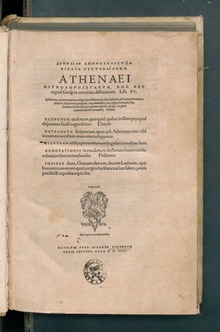Athenaeus
Appearance
Athenaeus (Ancient Greek: Ἀθήναιος Nαυκράτιος, Athếnaios Naukratios; Latin: Athenaeus Naucratita), of Naucratis in Egypt, Greek rhetorician and grammarian, flourished about the end of the 2nd and beginning of the 3rd century A.D. Suidas only tells us that he lived in the times of Marcus; but the contempt with which he speaks of Commodus (died 192) shows that he survived that emperor.
Quotes
[edit]Deipnosophistae (2nd century)
[edit]
- For it would be unbecoming, says Aristotle, to come to banquet covered in sweat and dust; for the true gentleman should neither be dirty nor be unwashed nor [Rejoice in mire], as Heraclitus says.
- V, 178F.[1]
- It was a saying of Demetrius Phalereus, that "Men having often abandoned what was visible for the sake of what was uncertain, have not got what they expected, and have lost what they had,—being unfortunate by an enigmatical sort of calamity."
- VI, 23, referring to mining operations.
- Every investigation which is guided by principles of Nature fixes its ultimate aim entirely on gratifying the stomach.
- VII, 11. Compare: "I look upon it, that he who does not mind his belly will hardly mind anything else", Samuel Johnson, in Life of Johnson (Boswell). 29 Vol. ii. Chap. ix. 1763.
- Dorion, ridiculing the description of a tempest in the "Nautilus" of Timotheus, said that he had seen a more formidable storm in a boiling saucepan.
- VIII, 19. Compare: "Tempest in a teapot" (proverb).
- On one occasion some one put a very little wine into a wine-cooler, and said that it was sixteen years old. "It is very small for its age," said Gnathæna.
- XIII, 47.

- οὐκ ἐν τῷ μεγάλῳ τὸ εὖ κείμενον εἶναι, ἀλλὰ ἐν τῷ εὖ τὸ μέγα.
- Goodness does not consist in greatness, but greatness in goodness.
- XIV, 6. Compare: "They ’re only truly great who are truly good", George Chapman, Revenge for Honour, Act v. Sc. 2.
See also
[edit]References
[edit]- ↑ Kirk , Geoffrey Stephen (2010), Heraclitus: The Cosmic Fragments, Cambridge University Press, p. 76. OCLC 944073052, ISBN 978-0-521-13667-9.
External links
[edit]- The Deipnosphists, translated by C. D. Yonge, at The Literature Collection

